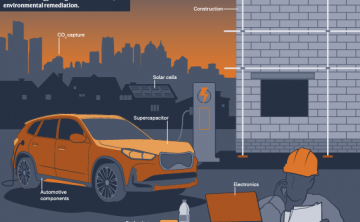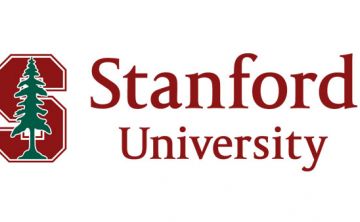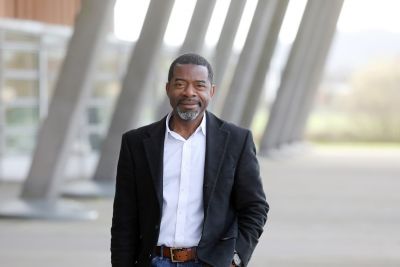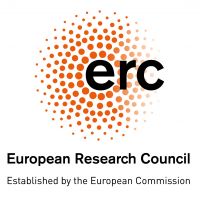Ange Nzihou laureate of the prestigious “ERC Advanced Grant” from the European Research Council
Professor Ange Nzihou has been awarded the prestigious ERC Advanced Grant for his innovative research on decarbonizing heavy industry.
Ange Nzihou rewarded with funding from the highly selective Horizon Europe grant program issued by the European Research Council
This is excellent news for Ange Nzihou, professor at IMT Mines Albi’s RAPSODEE UMR CNRS 5302 center, expert on biomass and waste valorization, currently fellow professor at the Andlinger Center for Energy and the Environment in Princeton University (USA), who has been selected by the European Research Council from among numerous competitive candidates for his STOREHEAT project on “innovative and sustainable carbon-based materials for the storage of sensitive high-temperature thermal energy”.
The ERC grant provides significant recognition of Professor Ange Nzihou's academic excellence and scientific innovation. This grant will allow the research project to reach new heights, paving the way for major advances in the decarbonizing of heavy industry.
ERC Advanced Grants are awarded by the European Research Council (ERC). It is the most prestigious European scientific program. It aims to fund pioneering research up to the early stages of commercialization. The only selection criterion for this funding schemeis scientific excellence. As stated in the press release announcing ERC Advanced Grants results for 2024, “selection is open to all confirmed researchers, recognized as exceptional leaders and who are conducting an exploratory research project.”
STOREHEAT Project: An innovative and Sustainable Solution solution for reducing CO2 emissions
STOREHEAT, the project led by Professor Ange Nzihou, aims to create a virtuous circle by using emissions that have negative environmental impacts to meet energy needs by tapping into the potential of biobased carbon.
The project removes several technological barriers:
- The recovery of waste heat at high temperatures (>550°C) emitted by heavy industry: the STOREHEAT project makes it possible to manufacture a locally produced biobased carbon material using biomass and biowaste, without preempting food resources.
- Energy storage: the properties of this biobased material make it possible to store energy and reuse it in the form of heat or electricity. This ability to manage intermittent energy needs is a major step forward.
- Decarbonizing high-temperature industry: There are currently no satisfactory solutions for reducing the 36% of CO2 emissions generated by heavy industry. The STOREHEAT project offers a solution with a major societal impact, not only by reducing these emissions, but also by reducing costs (production costs eight times less than SiC*), eliminating dependence on strategic metals, and recovering locally available residues. It also creates a new source of renewable energy.
* Producing 1kg of silicon carbide emits 430g of CO2 and requires graphite (produced from coal or petroleum coke), which itself emits 4,900g of CO2 per kilo of silicon carbide produced.
Heavy industry is responsible for 36% of CO2 emissions in Europe. There are not currently any sustainable materials that can recover and store heat waste from heavy industry other than silicon carbide (SiC), and a few rare ceramics, with has very high environmental impacts. Professor Ange Nzihou’s innovative research addresses this major environmental challenge by creating a promising method for transforming heat waste (>550°C) into a usable energy source using a biobased carbon material. After receiving the prestigious ERC Advanced Grant on April 11, 2024, Professor Nzihou is now in a position to make this technological breakthrough a reality.
STOREHEAT project: a European grant aimed at taking the project to an industrial scale
The STOREHEAT project on “innovative and sustainable carbon-based materials for the storage of sensitive high-temperature thermal energy” led by Professor Ange Nzihou has been awarded an ERC Advanced Grant, making it eligible for European funding with a maximum budget of €2.5 million that can be allocated to each winner. This funding granted for a five-year period aims to support the development of a pilot solution on an industrial scale.
STOREHEAT’s ambitious goal is to develop a pilot industrial-scale decarbonization solution within the next five years to provide a tangible response to the environmental challenges posed by heavy industry.
This funding is particularly selective, considering that the STOREHEAT project, presented in the field of “Materials Engineering”, is one of the 255 projects selected from among the 1,829 projects submitted by researchers from 19 countries. It is one of the 37 French projects selected, placing France in third position behind Germany and England.
“The prestigious support from the European Research Council provides a great opportunity for structuring the work on sustainable carbon materials at international level. IMT Mines Albi’s RAPSODEE Research Center, a joint CNRS research unit, is among the most advanced in Europe in this field, especially in the area of biobased carbon materials. This recognized expertise and the scientific breakthrough proposed by the STOREHEAT project were a decisive factor in obtaining this European funding, along with the societal component of the project: reduce the 36% of CO2 emissions generated by heavy industry, for which no solution currently exists, and recover the wasted heat, which is the equivalent of 16% of Europe’s total annual heat consumption.”
Ange Nzihou, professor at RAPSODEE UMR CNRS 5302 IMT Mines Albi, visiting fellow professor, Andlinger Center for Energy and the Environment, Princeton University (USA)
Ange Nzihou - world-class expertise reaching as far as Princeton University
Ange Nzihou is a pioneer in waste recovery and energy transition solutions. His research has thus led to the creation of new mechanisms for energy production from biomass or biowaste. The researcher at IMT Mines Albi’s Research Center for Process Engineering of Divided Solids, Energy and the Environment (RAPSODEE UMR CNRS 5302), where he served as director for 9 years, is the leader of an international scientific community dedicated to this line of research. He is one of the most influential researchers in the world, according to the prestigious ranking by Stanford University. Since 2022, he has contributed his expertise to the prestigious Princeton University as a Fellow Professor at the Andlinger Center for Energy and the Environment , where he leads the scientific theme on sustainable carbon materials. This collaboration is in keeping with the American laboratory’s goal to position itself as a leader in R&D on renewable energies, environmental protection and climate change.
In addition to honoring the work by Professor Ange Nzihou, this distinction provides recognition for IMT Mines Albi’s RAPSODEE UMR CNRS 5302 Research Center, which further strengthens our institution’s position as a major player in global scientific research. The development of biobased carbon materials is one of the scientific themes pursued by IMT Mines Albi’s RAPSODEE UMR CNRS 5302 Research Center. Its research community is working to substitute renewable carbon for fossil carbon and to develop technologies that produce low-carbon energy and help decarbonize industry. The dynamic nature of scientific publications related to bio-based carbon materials by IMT Mines Albi’s RAPSODEE Research Center positions it among the best national and international centers.
News

Ange Nzihou, professor at the RAPSODEE Center UMR CNRS 5302, invited to co-lead the writing of an article on biocarbon (biochar) materials for a world-renowned journal.

La prestigieuse Université américaine Stanford établit annuellement le classement des chercheurs les plus influents dans le monde parmi plus de 8 millions de chercheurs.



